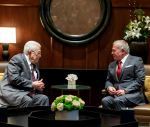You are here
Regulating Iran-Israel responses to prevent full-scale war
Oct 12,2024 - Last updated at Oct 12,2024
The tension between Iran and Israel is one of the most complex issues in the Middle East, dominating the geopolitical scene in the region for decades, due to the conflict of strategic interests between the two sides and the escalation of tensions over security issues and the Iranian role in the region.
Israel is trying to contain Iran's growing influence in the region, especially about its nuclear programme and its support for armed militias in Lebanon, Syria and Yemen, while Iran sees Israel as an existential threat to its national security and acts accordingly. Considering this conflict, the possibility of military escalation between the two parties remains possible, but there is also an ongoing effort to regulate mutual responses to ensure the avoidance of a comprehensive war, the results of which could be disastrous for the entire region.
The conflict between Iran and Israel is represented by a series of mutually destructive responses, as each party seeks to harm the other without being drawn into a direct military confrontation. This strategy relies on responding through indirect means such as air strikes, covert operations, or cyber-attacks. For example, Israel periodically carries out air strikes on Iranian targets in Syria to undermine Iran’s military influence in the region.
In return, Iran relies on its allies in Lebanon, Syria, Iraq, and Yemen to respond to these attacks by launching missiles or carrying out attacks against Israeli interests in the region. In this context, controlling these mutually destructive responses is a major challenge, as any uncalculated escalation could lead to a direct confrontation between the two parties.
The targeted attacks carried out by Israel are calculated to avoid igniting a broad conflict, while Iran prefers to respond in a limited manner through direct response and through its proxies to avoid an open confrontation. This fragile equation aims to achieve deterrence without crossing the line that could lead to a comprehensive war. There are several factors that contribute to controlling mutual responses and avoiding escalation into a comprehensive war.
First, both parties realise that entering an open confrontation will lead to significant human and economic losses. For Israel, a war with Iran would mean massive missile attacks from Hizbollah or Iranian territory, causing massive destruction to its major cities and threatening its internal stability. As for Iran, an open confrontation with Israel would expose its military and civilian infrastructure to severe blows that could deprive the Iranian regime of its ability to continue its regional projects, especially in light of the economic sanctions imposed on it and the internal challenges it faces.
Second, both sides rely on international and regional mediators to contain tensions. Russia plays an important role in this context by coordinating with Israel and Iran in Syria, where Moscow is trying to prevent tensions from escalating to an uncontrollable level. The international community, including the United States and the United Nations, also plays a role in pressuring both sides to avoid any steps that could lead to escalation.
Third, Iran and Israel have multiple strategies to achieve their goals without resorting to direct war. Israel relies on its technological and military superiority to launch surgical strikes aimed at limiting Iranian capabilities without drawing Iran into a full-scale confrontation. In contrast, Iran uses asymmetric warfare tactics, such as supporting armed groups and launching limited missiles, to ensure that it sends a message of deterrence to Israel without causing unintended responses.
Despite efforts to control mutual responses, the risk of unintended escalation remains. Any unintended incident or miscalculation could lead to things getting out of control. For example, a large number of civilian casualties in an Israeli or Iranian attack could escalate public anger and pressure leaders to respond more forcefully, potentially pushing both sides towards open confrontation.
There is also always the risk of accidental incidents on the battlefield, such as the targeting of sensitive sites or the unintended escalation of naval or air engagements. Such events could be a tipping point beyond which it is difficult to de-escalate.
In order to avoid a full-scale escalation, both sides can adopt a number of strategies. On the military level, coordination with international mediators can be enhanced to ensure open channels of communication that prevent accidental escalation. In addition, both sides should adopt a policy of limited response, so that any military operations remain within a calculated scope that reduces the chances of unintended escalation.
Intensifying diplomatic efforts can also help ease tensions, especially if tacit or explicit understandings are reached on how to manage the conflict in a way that does not lead to a full-scale confrontation.
Finally, the conflict between Iran and Israel remains complex and multidimensional, and the chances of escalation still exist. But by controlling mutual responses and adopting calculated strategies, both sides can avoid sliding into a full-scale war that could have dire consequences for the entire region.
Hasan Dajah is professor of strategic studies at Al Hussein Bin Talal University














Add new comment